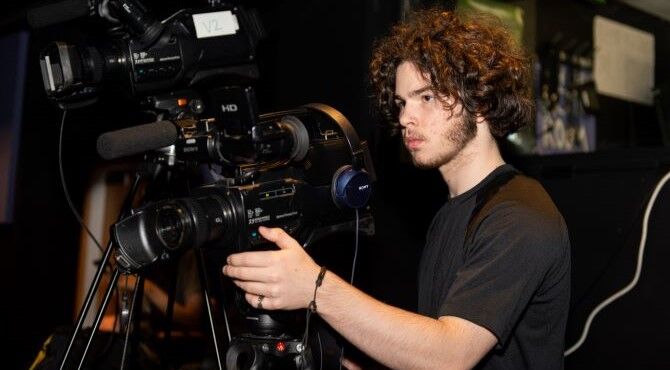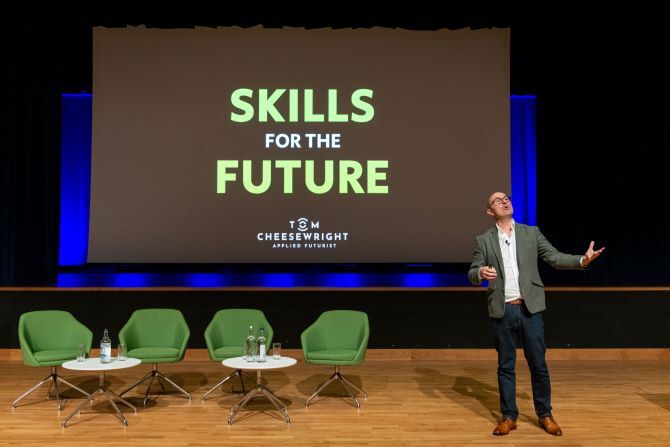How to teach future-readiness
Fiona Murchie caught up with futurologist Tom Cheesewright and head of school, Rob Crowther, at ACS Cobham’s Future-Ready Forum to find out why looking forward is so important and what skills we need to do this.

 21 October 2024
21 October 2024The latest issue of Think Global People magazine is out now!
Tom Cheesewright works with public- and private-sector organisations to discover what their world will look like in the coming years and decades and equips executives with a framework to shape the future.This idea of readiness is at the heart of ACS International Schools’ approach. It empowers students with the skills and knowledge to thrive in a world that is changing fast.Rob Crowther, head of school at ACS Cobham, joins Tom Cheesewright to about the future and what our children need to excel.
What do you think the future of young people here today will look like?
Tom Cheesewright (TC): I am generally an optimist. I think their future is going to be quite different. Look how much culture has changed in the last 20 years, how much the economy and aspirations and expectations have changed. For example, 20–25 years ago aspirations about what we own were about having a big DVD collection or a beautiful sound system or a shiny car, whereas now people are so much more aspirational about what they do and the experiences they have both in work and outside of work. They want to learn. They want to travel places and they want to be seen travelling to those places.So, a lot has changed. But actually the skills you need in order to succeed and thrive in a world that is very fast changing in terms of technology, culture and media, have changed too. One of the things I’ve noticed coming here to the school is how much they are using practical exposure, as well as academic education, to really start to develop some of the skills I am going to talk about tonight. That practical exposure is a really important part.The point of tonight is both to communicate my view, see what those skills look like and also to talk to the other panellists who are fascinating in terms of their perspective, either looking inside education or working with other organisations. I am hoping to hear from some parents and pupils too about their perspective.Read related articles
- Learning how to think about the future and the skills business and students need
- Future-Ready Forum reveals top skills students need to thrive in the future
- AI in education
- 10,000 students descend on Thorpe Park for a rollercoaster day of STEAM learning
- A class act: education of the future

Why is strategy important?
TC: The most important strategy for any organisation, and that includes a school, is an appreciation of the future. A lot of organisations I go into don’t think about the future very much, which is why it is nice to come to an event called the ‘Future-Ready Forum’ inside the school because clearly somebody is thinking about the future, which is very unusual, weirdly!I advocate taking one per cent of your time to focus on the future. One day every six months, you step back, you think about the future with an open mind on whatever that might be.Once you do that thinking and take the time out of your life and your working day, the single most important strategy is agility. We’ve got to be able to respond to change; we’ve got to be able to respond to what is next. When you start to think about the future, it does open up your mind. It forces you to look at the organisation and ask are we stuck in our ways?’ and ‘are we tied to the way things are today?’Do we need to be thinking about actually not just what the change should be, but also how do we change and how do we keep changing in order to respond to a changing world?One of the things that frightens people about change is the fast pace at which it is happening. How do people cope with that without feeling overwhelmed?
TC: Even five years ago now when I did the original research, two-thirds of the country said that they felt destabilised and that the speed of change was knocking them off their feet and I suspect it has only got worse since then.There is such rapid change. Not in everything; I live in a 150-year-old house and that hasn’t changed an awful lot in 150 years. But lots of things do change very quickly. Media, technology, culture, fashion, food, and the range of things we eat has accelerated so much because technology has stripped the friction from innovation and distribution. Things can be designed into products and services and shipped so much faster than they could 10 or 20 years ago thanks to technology.You’ve got to be able to respond to that. You’ve got to be able to take in the information, process it and create new things for that changing market demand. Communicating is vital too, he concluded, “You’ve got to be able to sell your ideas in the current world.Is there a process people can go through to manage that?
TC: Absolutely. Not just at school age, but also throughout our lives, it is about doing those things beyond the academic, beyond the day job that teaches you skills. Roller skating, for example, when I was 38. I learnt I was learning things that I was bad at and learning again, going right back to ground zero where I had no previous experience. I fell over a lot. My knees and elbows were like jelly, but the process of learning, suddenly being naive again, and being the new person in the room was so powerful for me as an adult. Learning to learn is really important.Is the world to come going to be a world of lifelong learning?
TC: Absolutely. It doesn’t stop. If you look at the shortages we have in the workforce now around the world there aren’t people to fill those gaps. There aren’t enough people with those skills coming out of university, certainly not enough with the skills we want and need. So you have to be constantly retraining.We are going to see the world of work very disrupted in the next 20 years. Right now we are at relatively low unemployment rates. It is almost a seller’s market for work, but that is not going to be the case in ten years’ time as we start to employ more AI. There is going to be more competition for jobs and if you want to compete, then you’re going to have to keep learning and relearning. In some ways that is kind of terrifying, but in other ways it is hugely exciting because it is the most satisfying thing to do once you get into that mindset of learning to learn, enjoying the growth and continuing to learn and I hope we can inspire people to do that.What does the future of education look like do you think?
Rob Crowther: I think the most exciting thing about that question is that we don’t know. We are used to preparing children for jobs that didn’t exist and now we are preparing them for a world we can’t predict, because the world is changing so rapidly.What we have to do is make sure the kids are future-ready in terms of their skills: that they are able to enquire, work collaboratively with others, show resilience and empathy and direct their own learning in a world that is changing so rapidly.What is the curriculum you mainly teach at ACS Cobham?
[RC] We have the International Baccalaureate Diploma programme and Advanced Placement (AP), US College Board Courses. Both of those courses ask students to enquire, to work with each other, and to make sure that they are well-rounded in terms of their education and not focused solely on one place.What about STEM/STEAM subjects: are they particularly important do you think?
[RC] I think they are very important, but I think rather than focusing on specific subjects, I think we need to be looking at creativity and innovation spaces where students can embrace technology within all of their classes and not just one that might be termed STEM or STEAM classes.How do you do that across different age ranges for example?
[RC] From the very earliest grades in our school. We have children at the age of two and even at early childhood there are innovation spaces where they are experimenting with technology to produce new learnings and that goes right through the school. They integrate that into their regular programme and to all their classes, so technology isn’t separate or an add-on, but it is actually involved in all that they are doing.We have a number of students here tonight from our media studies class in the high school who will be filming and presenting this back to other students. We are trying to use real-world skills in a school context.What can parents do to encourage children to be ready for the future?
[RC] I think parents need to encourage their children to experience all that is out there. To not be focused on a particular job or a particular pathway, but to embrace change, to meet challenges head on and to work with their classmates and their teachers to build the future that they want to see.Do you think the future is global?
[RC] Absolutely, we are an internationally minded school. We talk about being an internationally minded person and what that means and how we can take our learning out into the community and become part of the global community.
Read Relocate Global's Guide to International Education & Schools 2022/23 which is packed with expert tips and information for those relocating and the professionals supporting them.
Relocate Global's Guide to International Education & Schools 2024/25 coming soon!
Find out more about the Think Global People and Think Women community and events.


Subscribe to Relocate Extra, our monthly newsletter, to get all the latest international assignments and global mobility news.Relocate’s new Global Mobility Toolkit provides free information, practical advice and support for HR, global mobility managers and global teams operating overseas.
©2025 Re:locate magazine, published by Profile Locations, Spray Hill, Hastings Road, Lamberhurst, Kent TN3 8JB. All rights reserved. This publication (or any part thereof) may not be reproduced in any form without the prior written permission of Profile Locations. Profile Locations accepts no liability for the accuracy of the contents or any opinions expressed herein.





































